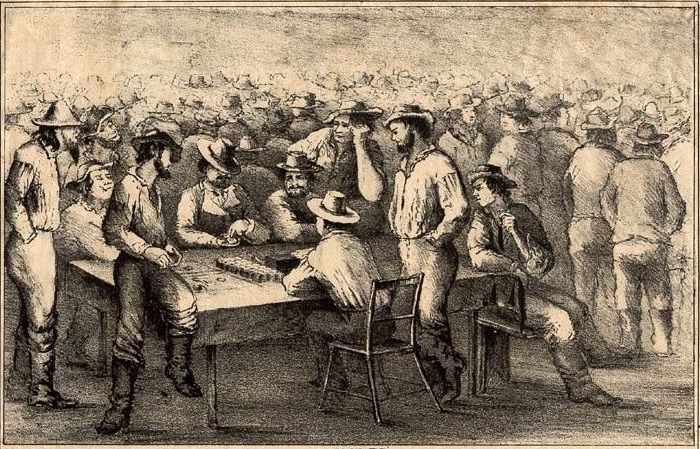 Gambling in America has its roots in the soil of its earliest inhabitants, those who lived here and those that gambled their lives on the prospect of a new world. Both would have a profound effect on how Americans view gambling. No people have embraced gambling more than the original Americans. They experienced gambling as a secret ritual. Games of skill like lacrosse and a crude form of checkers matched players against one another, as well as dice and the throwing of bones.
Gambling in America has its roots in the soil of its earliest inhabitants, those who lived here and those that gambled their lives on the prospect of a new world. Both would have a profound effect on how Americans view gambling. No people have embraced gambling more than the original Americans. They experienced gambling as a secret ritual. Games of skill like lacrosse and a crude form of checkers matched players against one another, as well as dice and the throwing of bones.
Tip: Visit bestrealmoneycasinos.co.uk – best site for casino gamblingfor an exhaustive guide to the top online casinos.
For ancient Americans, gambling represented a peaceful way to redistribute wealth among their tribes. When goods were not available to wager, it was not uncommon for a man to risk his own freedom and slave himself to those in which he lost ultimately. Gambling among native Americans was about the sacrament of community.
The native American attitude towards gambling was replaced by a more divisive approach at the moment the first white foot hit the shores of North America. When English arrived in Jamestown in the 17th century, they brought with them a sense of risk-taking which was reflected in their love of gambling. Dice and Cards were well-established forms of gambling in England and were soon used to pass the idleness of the new world.
By 1610, racehorses had arrived in the Virginia Colony. The popular sport of horse racing soon became an everyman sport, attended by a rowdy and informal group of spectators. The settlers were establishing their own identity and gambling was a perfect reflection of the new attitude. But the colony soon became debt-ridden. The answer of the problem was the problem itself. The English decided to hold a lottery, the hypocrisy had begun but as long as the government could benefit from gambling, it could easily justify its use. Lotteries were just seen as the easiest way to rise money.
For the next century, lotteries funded everything from the new roads, to the building of great educational institutions such as Harvard, Yale, and Princeton. The lottery was seen as a practical and benign form of taxing that benefitted the country.
Other forms of gambling, however, were not as readily accepted by the opponents of gambling. There was the conception that gambling encourages violence. The battle lines have begun to form, on one side with the moralists and the government, on the other side were hard working men and women with limited diversions.
In a move to stop the growing problem of corruption, England banned any and all lotteries that were designed to support the colonies. The colonists would have to find other ways to support themselves. With the support of the population, the first national lottery was established to fund the Revolutionary War, 100k tickets were sold with prizes ranging from $20 to $50k to be paid in treasury notes over a five-year period. Although the government goal of one million dollars was not reached, enough money was raised to provide a temporary reserve.
The same year, while composing the Declaration of Independence, Thomas Jefferson proclaimed “gaming corrupts our disposition and teaches us a habit of hostility against all mankind”. The years following the Revolutionary War saw an unprecedented grow in America’s population and gambling was soon enjoyed among all classes of the society.
During early 1800, no one enhanced the reputation of gambling more than Andrew Jackson. As a child, Jackson bet against grown men at the local cock fights. During the college years, he gambled on a dice game, but it was horse racing that Jackson was most passionate about. After being elected president, Jackson frequently attended the national racetrack, just outside of Washington.
Gambling then made big time. It was still technically illegal, but before long, commercial gambling took all the New Orleans where the first casinos dubbed “Carpet Joints” were introduced. Gambling became so rapid during the 1800s, that legislators openly discussed the legalisation until pressure from law enforcement officials persuaded otherwise. Sitting in the background with the moralists – small but growing in power – they were compelled to do something before the gambling epidemic completely overtook America. The response was brutal and would become one of the most memorable moments in the history of gambling.
Learn more
The introduction of the wide web has made life taken a turn for the better for the most part. The online platform has made the world a global comm ...
Playing Games is always been a favorite for kids in Germany. Even adults too show interest especially when it comes to playing online. Apart from ...
Making Sense of the Cape's One-of-a-Kind Water Issues Geospatial Perspective: Cape Cod Has Big and Bad Water Problems Cape Cod is a peninsula kn ...
The Internet has changed things all over the world. It has created opportunities where none existed. Even the lottery today is done online. A few ...
Over the last two decades, the number of women-owned companies in the US has increased by 114%. Even though this data is a great milestone for bus ...





